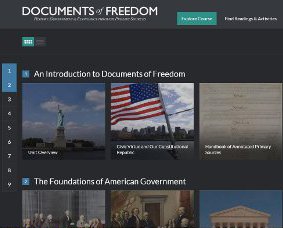The Bill of Rights Institute offers a free online course, Documents of Freedom: History, Government and Economics Through Primary Sources, that easily satisfies the requirements for Government and Economics courses at high school level. The list of topics covered under government and economics is very close to those covered in traditional texts for those subjects, but the approach and the resources used are significantly different.
The course uses an inquiry, critical thinking, and discussion approach. Students read and discuss a number of readings which have been kept to a manageable length for students. While some activities direct students to write, the amount of writing specifically required by the course is relatively low.
The course is presented in nine units with several subtopics within each unit. Most subtopics have an extensive lesson plan with readings and activities. The course was designed for classroom use, so many of the activities direct students to discuss or compare their responses. While a parent can discuss the readings with a student, it would be best if two or more students could meet at least periodically for such activities. Some activities such as a “bidding” activity that illustrates supply and demand really require a larger group, but homeschoolers could still approximate the lesson’s intent with a discussion.
Occasionally, a link to a video is included within the course, but I didn’t spot many of these. Students complete a Venn diagram in one activity and a chart in another, and you'll see other such activities from time to time. The activities vary from lesson to lesson. A few subtopics have only one essay to read without any additional activities. However, the core essay reading for each lesson does conclude with one or two multiple-choice questions which students answer online. These aren’t tracked so they only serve as a “self-check” for students.
Lesson plans direct students to the readings with links provided within the course for either downloading or viewing the readings. Readings are either excerpts from primary sources or essays. The course uses a broad range of primary sources with readings from sources such as Plato’s Republic, The Federalist Papers, the Plessy v. Ferguson case, [President] Johnson’s “First Annual Message to Congress,” Jefferson's “Opinion on the Constitutionality of a National Bank,” and the “War Powers Resolution.”
A parent or teacher could print out readings in advance so that students can make notes as they read, but student can just read them online if that works for them. Sometimes, discussion or essay questions are included at the end of an essay. These cannot be answered online. Answer keys are included, although many answers are unpredictable.
Some activities require research which will generally be done on line or through readings that you can print out. At least one activity requires students to give a “mini-lecture” on a research topic, but homeschoolers could either present a speech or write an essay in such instances.
All of these activities are laid out in order with clear instructions under "Activities" for each lesson. This makes it very easy to follow the lesson plans and access everything you need quickly.
Even though this is a course designed to promote critical thinking and discernment, it has been written to promote certain points of view through the selected readings and activities. It promotes patriotism, adherence to the Constitution and the rule of law, limited government, and virtues. It presents virtues in a humanistic sense rather than a religious sense, listing justice, self-government/moderation, humility, responsibility/prudence, perseverance, courage, respect, contribution, and integrity as key civic virtues.
The course should ideally be used in a group class that meets once or twice a week, but it can be adapted for use with a single student. The teacher or parent will have quite a bit of reading and preparation for class discussions and activities whether working with a group or a single student. There are no exams for the course, but student evaluation could be accomplished by having students periodically write essays on topics they have been studying.
If you have the time to use it properly, this course should be very thought provoking for both students and teachers, and students are certainly likely to remember what they learn.









